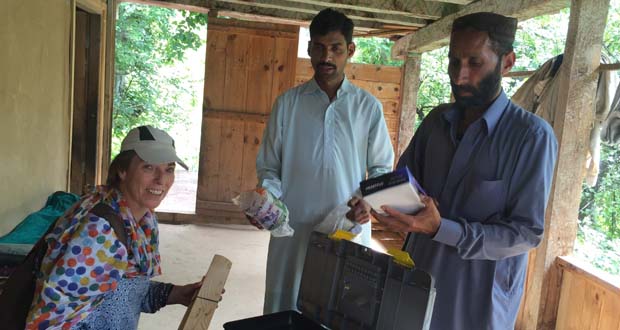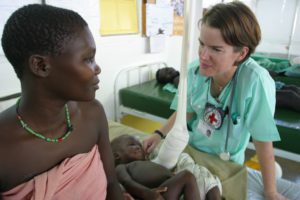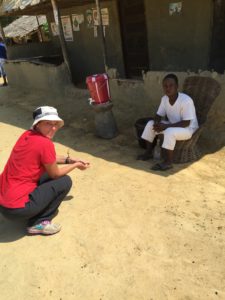Denise Moyle's journal entry 18.4.2010
Another day that after 13 hours of work I don’t have the energy to write, however a significantly profound day. I am exhausted. 30 patients in 24 hours. Mass relocation of hospital patients. So, the story… I will find the time, it’s important I remember.
Four blasts in two days. The first at a food distribution centre, the second, minutes later when rescue teams arrived. The third, later again and the fourth the following morning. 45 dead, and many wounded.
As the hospital's head nurse, I somehow find the space to increase the hospitals capacity from 80 beds to 105. The surgical team perform 8 laparotomies, two craniotomies and many chest drains and tractions in less than 24 hours. I have hardly seen them, yet we have all worked alongside together.
I’m teary, but I guess I am so exhausted.
I arrive home late and find my housemate Luis (air-ops coordinator) watching a boxing movie on TV and I just had to leave, it was too much trauma for me at this point in time and I’m on the verge of tears again. Too much unnecessary fighting.
Denise Moyle is now back in Australia, “hiding from a three-year-old” as we speak, a far cry from any blasts or crammed wards.
She was recently one of four Australian nurses who were awarded a Red Cross Florence Nightingale medal, the highest international distinction a nurse can receive.
Like a lot of nurses, Moyle says she fell into the profession. And still, after a number of years and different roles, she just wasn’t sure about nursing. She hadn’t found her niche.
“I saw the advertisement for Australian Red Cross nursing… and thought 'I’m going to give this a go'. I think this was my last hit at nursing, giving it a go and trying to find my passion,” she says.
“And bang, I hit the nail on the head.”
She recalls her first deployment to the Kenya/Sudan border. Treating people with war injuries, the ward had no ventilators, no oxygen tanks, and no frills. But they made do and provided “really good clean surgical care” that was “really effective”.
Living in these conditions can be just as difficult as working in them. She tells me about the posting to the Kashmiri ranges in Pakistan after an earthquake that had killed “one hundred thousand people-plus”.
Moyle spent four-and-a-half months living in a “mini MCG-equivalent” style stadium, where she ate in tents, worked in tents and showered in tents, very rarely leaving the stadium.
The Red Cross nurses are at the mercy of the elements, often in hot and dusty or freezing cold climates and they try to decompress as best they can. Moyle would escape through her journaling.
The dangerous conditions can also be tough on families of the Red Cross nurses.
Moyle's family were hesitant when she put her hand up to fight the Ebola crisis (she eventually couldn’t go as she found out she was pregnant). Her family’s feelings were also in her mind when she was considering going to Syria.
“Now, I would have to discuss the location and role before putting my hand up,” she says.
“You used to be able to display [the Red Cross emblem] with pride all over the world. Whereas more and more there is less respect in parts of the world and I don’t think we can fly under the radar with our protective emblem… at times it makes us more vulnerable.”
Working to the tune of bomb blasts and shaking windows “turns up the dial on your awareness”, and these heightened stress levels can be tough mentally, as well as physically.
There is also a need to be culturally and politically aware, and Moyle tells me about tense dealings with the Taliban and Pakistani government, leaving her mentally drained.
Overall, she doesn’t think the effect trauma can have on nurses is talked about enough.
After that tough 18 months in Pakistan, Moyle struggled to adjust to her old life.
“I came back to Australia and the impact of how I’d been holding it together for so long, without batting an eyelid, was significant for me.”
Moyle took three months off after that tour and suddenly simple things such as showing her arms in a short sleeve t-shirt became difficult after being on alert in a conservative country for so long. She went through, as she put it, “reverse-culture shock”.
Talking to parents and friends was hard too.
“Often people say, ‘How was it?’
“And I remember the first time trying to explain how it was and after five minutes someone said, ‘Ah yeah, the lawnmower broke down on the weekend’. And I’ve just been telling a story about someone riding a donkey for three days in labour and the baby’s dead.”
Eventually she would tell people that it was a really good experience, just to move the conversation on.
“But then I would think, ‘What kind of sicko am I? Who has a really good experience in war-torn Africa?” she says.
“The best debrief I had was with other humanitarian aid workers… they get it.”
Despite all of this, Moyle loves what she does. And looking back on a time when she was at that cross-roads, when perhaps nursing wasn’t in her future, Moyle is now sure in her chosen profession.
“Clearly, I’ve found my niche and I’ve had a great career. I’m very glad I stuck it out,” she says.
Moyle feels incredibly lucky to have been recognised with the recent Florence Nightingale medal: on a personal level, but also to highlight the massive role all nurses play in society.
“It’s a good opportunity to signify the role of a nurse and how valuable nurses can be,” she says.
“It’s a really valuable profession to get into… and I feel really honoured and proud to have been acknowledged.”
Yvonne Ginifer
“I’m a bit of a gypsy,” Red Cross nurse Yvonne Ginifer tells me with a laugh. I asked her where she is currently and she lists off all of the places she has lived.
Ginifer’s parents were teachers and they moved around a bit as she grew up, perhaps instilling an adventurer’s spirit in her.
Travel has always been a big draw, Ginifer says. She went bush straight out of university and practised nursing in rural and remote communities for three years.
She had to learn quickly as she was the only nurse in town.
“Working independently, you have to be really confident in your skills and make good decisions.”
However, wanderlust persisted, and a stint backpacking in Europe then led Ginifer to a job cooking on an overland truck driving through Africa.
“There was one tour company that had a cook. So, I just rang them up and told them who I was, told them I’d done some cooking for shearers – which was a furphy – and they were really keen to take me on.”
That trip lasted three years before Ginifer came home and started remote nursing again, picking up her midwifery qualifications along the way. But it took some personal turmoil for her to find the Red Cross.
“I had a relationship breakdown and I couldn’t have kids, and I thought, ‘What am I going to do now?’
“I had to do something significant, something with my life that I can be satisfied with in the long term. And that’s when I thought ‘Red Cross is it, I’m going for that.’”
After a lengthy recruitment process, Ginifer found herself going to conflicts and disasters in Myanmar, Afghanistan, Pakistan, Somalia and Sudan, as well as a tour attempting to control the Ebola epidemic in Liberia.
“Someone had to do it,” she tells me after I remark how scary that crisis was. "They needed as many people to go as possible and I felt I had a responsibility to go, because I could go."
Apart from a couple of moments of contact with potential carriers, Ginifer felt safe in Liberia, as she has for most of her time overseas.
“I have great faith in the Red Cross structures and systems for security,” she says.
That doesn’t mean that the job is danger free.
We talk at length about some security incidents that have occurred in her time with the Red Cross and one in particular, which she asks me not to print, brings the reality of this high-pressure nursing to the fore. You can hear the pain in her voice.
“I came home a bit tired and a bit confused. It was an emotional stretch,” she says.
“It is pretty tricky out there and some places are more difficult than others.”
Like Moyle, Ginifer tells me that the trauma of nursing is compounded when you are overseas, living and nursing in disaster and conflict conditions.
Ginifer praises the Red Cross and its approach to psychological support. Nurses have a briefing prior to a mission and access to a psychologist during a mission and for as long as they need afterwards.
She also praises the Australian Red Cross for its insistence that nurses take breaks between missions.
Ginifer is now home, taking some down time, renovating her house and being recognised for her brave work with the Florence Nightingale medal.
“It was a huge shock. I didn’t know I was nominated. And then to receive the award, I was absolutely humbled and absolutely surprised.
“And my first thought was that there are so many other amazing nurses out there.
“I felt very honoured and as time has passed it has settled down into 'This is really, really lovely,'" she says.
The award is validation of that life changing choice Ginifer made, but like all of us, it is sometimes just nice to be noticed for what you do.
“You are a bit invisible otherwise. My family, my friends all know what I do, but it has brought to their attention that it has more value than they anticipated.
“It’s what I do, and I think it’s important, and now they do too.”
Do you have an idea for a story?Email [email protected]
 Nursing Review The latest in heathcare news for nurses
Nursing Review The latest in heathcare news for nurses



